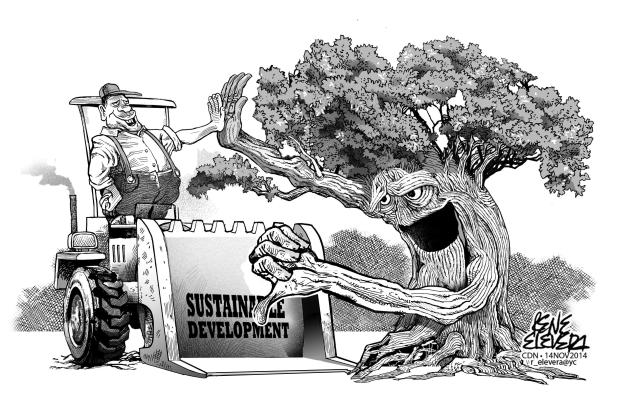 The ongoing debate over the cutting of trees in various parts of Cebu underscores a confusion over our development path. This confusion was addressed more than two decades ago.
The ongoing debate over the cutting of trees in various parts of Cebu underscores a confusion over our development path. This confusion was addressed more than two decades ago.
The global soul searching for the balance between growth and exploitation of the natural environment led the United Nations to establish the World Commission on Environment and Development (WCED) in 1983. Then UN Secretary General Javier Perez de Cuellar appointed Norwegian Prime Minister Gro Harlem Brundtland.
After four years of work, the WCED which became popularly known as the Brundtland Commission came up with a book which many thought would be a game changer – Our Common Future in 1987.
The book defined the development path that the world needs as a radical paradigm shift to address issues like food security, ecological integrity, inclusive economic growth and even global security. The growth-at all-cost paradigm which has been pursued since the industrial revolution, was creating scarcity of resources, resulting in massive poverty and the gap between the developed countries and the third world.
Our Common Future became the centerpiece document in the 1992 United Nations Conference on Environment and Development (UNCED) in Rio de Janiero, Brazil. It was in the UNCED that the global community agreed on the definition of sustainable development and the strategy to achieve it called Agenda 21 or the global development agenda for the 21st century.
The UNCED, adapting the Brundtland Commission report defined sustainable development as “development that meets the needs of the present without compromising the ability of future generations to meet their own needs.”
The Philippines was one of the first to adopt this definition.
Article 2, Section 16 of the 1987 Philippine Constitution declares that “The State shall protect and advance the right of the people to a balanced and healthful ecology in accord with the rhythm and harmony of nature.”
Listening to the debate between City of Naga Mayor Valdemar Chiong and green activist priest Fr. Robert Reyes over the cutting of 58 trees for an athletic oval earlier this week showed the big divide in the understanding of sustainable development.
Mayor Chiong defended the tree cutting as necessary for the development of his city, one of the most industrialized in Cebu and also one of the most polluted.
Father Reyes, whose spiritual model is Saint Francis, invoked divine justice in lamenting the sacrifice of the environment at the altar of development.
As Cebu continues its rapid urban growth as one of the most progressive provinces in the country, we will see more debates of this kind.
It forces the people to weigh the merits of different choices of moving forward.
After more than two decades, we are still struggling to find the right balance.
Disclaimer: The comments uploaded on this site do not necessarily represent or reflect the views of management and owner of Cebudailynews. We reserve the right to exclude comments that we deem to be inconsistent with our editorial standards.
